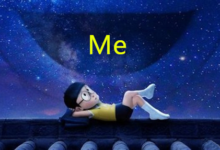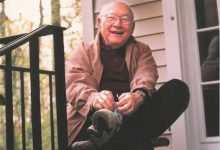My passion
I have a very pedestrian passion. I love to walk. With each passing year, I become more committed to going about my life on foot. I don’t do it for the exercise, though I’m glad for that, and I don’t do it to conserve fossil fuels, though conserving them is a good idea. The kind of walking I most enjoy has nothing to do with what people call hiking, and it doesn’t require special shoes. Nor am I looking for solitude. Writers get enough of that staring at all those blank pages. Filling them up is lonely work. No, I simply walk to the local deli for my morning coffee and newspaper, to the post office to drop off the mail, to the bookstore, to the local market, to the movie theater, to in-town bars and restaurants. When I can talk my wife into it, we go for long walks, not along the rocky Maine shoreline, which is beautiful, but rather, along our hilly streets all the way out to the cemetery and (so far, at least) back again. For me, it’s more a question of speed than of destination. “Our senses…were developed to function at foot speed,” Wendell Berry has written. “The faster one goes, the more strain there is on the senses, the more they fail to take in, the more confusion they must tolerate or gloss over.”
He’s right, of course. Children know, then in adolescence forget, that it’s far more rewarding to go slow through the world, not necessarily to smell the roses but to watch worms writhe in puddles. The house I grew up in, in Gloversville, New York, was three blocks from the neighborhood elementary school. This was during the ’50s, and our parents saw no reason why kids shouldn’t walk to and from. Had we gone straight to school as instructed, our journey, door-to-door, would have taken five minutes, ten tops. The more crooked and exciting route was through our neighbors’ backyards, where we climbed their fences, leapt off the roofs of their teetering sheds (the heights of these seemed dizzying at the time), admired their new barbecue grills. During this daily journey, which took about half an hour, we ruined our shoes, tore holes in the knees of brand-new pants, were shouted at by angry middle-aged women in powder blue bathrobes and then chased by dogs with ropes of spit swinging from unhinged jaws. We learned that people behave differently on their back porches than they do on their front ones, and that back-porch behavior is generally more interesting. We saw no reason not to share the bounty of our neighbors’ fruit trees, and we investigated with genuine curiosity what was underneath their garages. We arrived at school full of stories-of who had fallen hard on the ice at Sargent’s Hill, of the cool (and lethal) Viking-sword-shaped piece of fiberglass discovered on the scrap heap out back of the machine shop, of the big bottles of dusty off-brand soda discovered at the very bottom of the cooler out back of Charlie Drake’s corner store, soda he’d sell for the same price (amazing!) as a much smaller Pepsi.
Walking, I’ve come to believe, leads naturally to stories. People encountered randomly on the sidewalk have different things to communicate than do those same people met by design at a bar or coffee shop, where they tell you things they’ve planned to tell you (front-porch stuff, usually). And at foot speed, we notice different things than we do from a car, even one driven at village speed limits. In summer, afoot, you hear late-afternoon laughter from the unseen back deck and imagine the company gathered there (the cars out front all sport out-of-state plates), the bottle of chilled white wine sweating on the picnic table. Between houses you notice a small boy with a baseball mitt on one hand sitting all by himself on a motionless swing. Across the street, somebody is doing a forced march of piano scales by an open window. All the stories wait to be written. To walk is to understand a paradox: Though it takes longer to get places on foot, we’re less likely to feel as if we’ve wasted time than if we drove. It’s the difference between spending time and wasting it.
我是天生走路狂
我对步行充满热情。我热爱走路。年复一年,我越来越热衷于以双脚走我的人生。我步行不是为了锻炼,虽然我乐于那样做,也不是为了节省化石燃料,尽管那是个不错的主意。我所享受的步行和人们所说的远足没有任何联系,不需要任何特别的鞋子。我不是想远离尘嚣。整天对着白纸发呆的作家们已经厌倦了这种寂寞枯燥的写作生活。而我与他们不同,我只是走到附近的小食店享受我的晨早咖啡和报纸,或者到邮局寄信,到书店,到市场,到电影院和市中心的酒吧和饭店。有妻子陪伴时,我们会走得很远,不是沿着美丽的缅因岩石海岸走,而是沿着我们的山边小街一直走到公共墓地,然后折回来(至少到目前为止是这样)。我只在乎速度,去哪里倒不是问题。“我们的感受……会随着脚步的速度而变化,”温德尔?巴里写道,“人走得越快,感官的压力就越大,脑子就越不灵光,也就越要承受或忍受迷惑的折磨。”
当然,他说得对。孩提时的我们都明白,日渐长大后却忘了这个简单的道理:漫步世界是一种更高层次的享受,无须闻到玫瑰的花香,光是瞧瞧臭水沟中蠕动的小虫就足够了。在纽约的各罗维斯威尔,伴随我长大的屋子距离最近的小学有三个街区。在五十年代,父母找不到不让孩子步行来回学校的理由。如果按照大人说的那样挨家挨户地径直地走到学校,要五分钟时间,最多十分钟。更为曲折和刺激的路线是穿过我们邻居的后院。我们爬过后院的围墙,越过摇摇欲坠的棚子顶(那高度在那时看来是很吓人的),欣赏他们的新烧烤铁架。在这每日大概半个小时的路程中,我们的鞋子破了,全新的裤子的膝盖部位撕开了洞洞;穿着浅灰蓝色浴袍的中年妇女朝我们怒吼;看门的恶狗拖着长长的口水对我们穷追不舍追赶。我们发现人们在后门和在前门的表现大相径庭,在后门的行为通常有趣得多。我们没有理由不分享邻居果树的恩赐,我们还纯粹出于好奇心而去探究邻居的车库下面都放着些什么。我们带着各种各样的趣事回到学校:例如谁在沙准特山上的冰面上重重地摔下啦;冰冷的(看上去锋利无比的)海盗剑形状的玻璃纤维在工厂后面的垃圾堆堆积如山啦;染满灰尘、商标脱落的大瓶汽水被压在查理?德雷克小卖店里冰柜的最底层,而价钱和小得多的百事汽水一样(哇塞!)啦等等。
我越来越相信,走路自然就能让我们发现奇闻趣事。在人行道上不期而遇的人和特意聚在酒吧或咖啡厅里的人所交换的话题是大不相同的,因为后者说的是早已预备好的内容(通常这是前门式的表现)。我们在走路和驾车时的所见所闻也大不一样,即使车速慢到了法定乡村路段时速。在夏天的午后漫步,虽然看不到别人家的后院,但却能从传来的阵阵笑声中想象到那个快乐的聚会(客人的车子停在门前,上面的车牌号表明它们都来自其他州)。野餐桌上应该还有热得冒汗的冰冻白酒。房子之间,一个小男孩戴着一只棒球手套,静静地坐在秋千上。街道对面,有人在窗边极不情愿地弹奏着钢琴音节练习曲。所有这些故事都等着你去写。走路就是为了去理解这个矛盾。虽然走路比开车要花费更多的时间,但我们却不觉得这是在浪费时间。这正是花费与浪费时间的区别。














